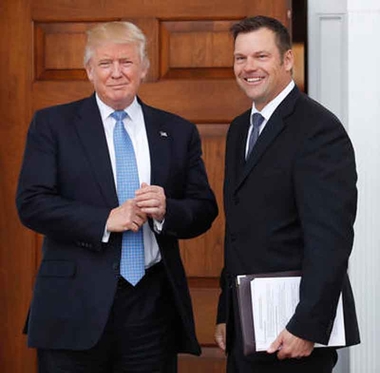Obama scraps registry for some immigrant men, mostly Muslims

Washington (AP) — The Obama administration on Thursday officially scrapped the last vestiges of a U.S. registration system for Muslim immigrants. If President-elect Donald Trump now wants to introduce an expanded version of the program, he will have to start from scratch.
The post-9/11 registration program for immigrant men arriving mainly from the Islamic world hasn't been enforced since 2011. Although it never prohibited travel for men and boys from the more than 20 affected countries, including Syria, Iraq and Afghanistan, Trump's suggestions about banning Muslim immigrants from the United States have led to fears that it could be reinstated and used for new and enhanced purposes.
The decision to erase it from the books entirely marks one of President Barack Obama's last administrative actions on immigration and will at least slow any Trump effort to introduce even tougher requirements, as has been suggested by a top adviser.
The registration program is "not only obsolete," said Neema Hakim, spokesman for the Homeland Security Department, "its use would divert limited personnel and resources from more effective measures."
The registration system started about a year after the Sept. 11, 2001, terrorist attacks, requiring men and boys from a variety of mostly Middle Eastern countries to register with the federal government upon their arrival in the United States. Such people already in the country had to register with immigration authorities inside the U.S.
Registration, which also applied to immigrants from North Korea, included fingerprints and photographs. People also were required to notify the government if they changed addresses.
Trump has never publicly spoken about the program, but has made clear his desire to take a far tougher approach toward immigration than Obama.
He and his advisers have suggested the rising terror threat in the United States, Europe and elsewhere is linked to insufficiently vetted refugees and immigrants arriving from predominantly Muslim countries. After a truck attack killed 12 in a Christmas market in Berlin this week, Trump told reporters, "You know my plans."
Kansas Secretary of State Kris Kobach, a Trump confidant on immigration, has been more explicit on his plans for the registry. Last month, he said he wanted to launch an updated system for all foreigners from "high-risk" areas.
Meeting Trump in Bedminster, N.J., Kobach carried a document labeled "Department of Homeland Security Kobach Strategic Plan for First 365 Days." It described a reboot of the National Security Entry-Exit Registration System as the top priority. Kobach helped draft the program while working at the Justice Department under President George W. Bush.
If Trump opts to restart NSEERS and create a new program, he will have to start from scratch with a process that includes notifying the public about his plans. That could delay a new effort by months.
The program had been widely derided by civil libertarians as an effort to profile people based on race and religion.
"With this action, the U.S. is on the right path to protect Muslim and Arab immigrants from discrimination," said Joanne Lin, the senior legislative counsel at the American Civil Liberties Union, which said the registry "didn't yield a single terrorism conviction in nearly a decade."
When the Obama administration abandoned the system in April 2011, it said a newer data collection program would be sufficient to collect biometric information for all foreigners coming into the country. At the time, more than 80,000 foreigners were registered.
By Alicia A. Caldwell, Associated Press. Copyright 2016 The Associated Press. All rights reserved. This material may not be published, broadcast, rewritten or redistributed.
The Gayly – December 23, 2016 @ 11:10 a.m.





